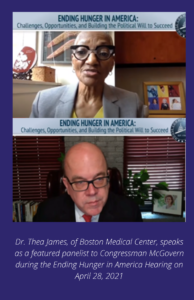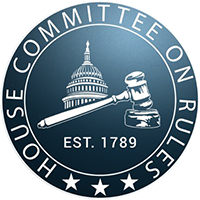
Cristina Chillem
The Committee on Rules is a subgroup of the United States House of Representatives. Their purpose is to consider all bills reported from policy and fiscal committees and determine what will be brought to the floor of the House.
On April 28, the Committee on Rules delivered a hearing entitled, Ending Hunger in America: Challenges, Opportunities, and Building the Political Will to Succeed. Congressman Jim McGovern of Massachusetts led the meeting by calling it an “all-hands-on-deck moment.” By listening and examining the shared experiences of Americans, Chairman McGovern opened the floor to a discussion on the causes of hunger and potential solutions to help mitigate this omnipresent issue.
This panel featured: Dr. Thea James, Vice President of Mission and Associate Chief Medical Officer, Boston Medical Center, Ms. Ayesha Curry, Co-Founder, Eat.Learn.Play. Foundation; Ambassador, No Kid Hungry, and Ms. Heather Reynolds, Managing Director of the Wilson Sheehan Lab for Economic Opportunities (LEO), University of Notre Dame. The discussion proved a true platform for Americans with lived experience and expertise in food insecurity to voice personal and professional insights, including criticisms of established federal public assistance programs. While all three panelists agreed public assistance programs are critical and effective in alleviating immediate hunger, like free and reduced school lunches that ensure youth receive the nourishment necessary to learn, such programs fall short of advancing sustainable economic opportunity.
Congressman McGovern asked to what extent Congress should be thinking about economic opportunity as a solution to hunger. The predominant sentiment among panelists was that economic opportunity is the only long-term solution to hunger.
James explained that the 40 safety net programs Boston Medical Center administers are intended to prevent people from “falling into gaps or fill the gaps that people have fallen into, but do not necessarily work to eliminate gaps”. In the case of food insecurity, consider how the Supplemental Nutrition Assistance Program (SNAP) benefits offset a household’s grocery expenses but do not actually liberate them from chronic financial insecurity; each month, they need those public dollars again to afford sufficient groceries. James stated, “I believe only through eliminating those gaps is it possible for people to become self-sufficient, and [gain] financial security, economic mobility, and even opportunities to build wealth.” James provided the specific example of public housing subsidies that penalize and deter families trying to achieve self-sufficiency, as the housing subsidy is revoked if the household’s earned income exceeds a maximum limit.
Reynolds suggested improving the traditional delivery of direct monetary assistance with personalization and accompaniment. Reynolds referenced findings from LEO studies that applied scientific evaluation methods to better understand the effectiveness of service providers’ poverty interventions. Evidence from one study shows low-income students are more likely to complete college degree programs when “service providers balance the short-term needs of clients with the long-term needs of financial stability.”
Reynolds provided the example of a woman named Paula, a former client of Catholic Charities Fort Worth, who received intensive case management alongside financial assistance to help her achieve her “bigger, brighter future.” Rather than merely hand her an electronic benefits card with SNAP funds on it and send her off, case management met routinely to help her identify the root cause of her chronic unemployment. Paula did not feel safe leaving her son at the only daycare she could afford. Paula was then offered a personalized financial assistance plan, wherein Catholic Charities matched dollar for dollar the money needed to send Paula’s child to a daycare she felt safe with but could not afford on her own, until Pearla reached a state of stable employment and savings where she could afford the whole cost on her own. This example illustrates what comprehensive, personalized, family-centered, long-term accompaniment and support looks like, and how it “works hand-in-hand with the safety net” to untangle families free from the root causes of hunger and overall poverty.
These highlights of how public assistance programs fall short of eradicating hunger offer a reminder and affirmation to all Americans of the importance of volunteering time, talent, and treasure to local food pantries and community food drives. Even with public assistance programs, the basic need for food is still a constant, urgent reality for neighbors every day. With the support of our donors and partners, Fiorenza’s Food For Friends is proud to be able to fill a gap in the community for food assistance without further taxing the already-stretched welfare system, as the food we connect families to is not federally funded.
Like Congressman McGovern and this hearing’s panelists, F4 believes hunger can be solved and that America does have the innovation and political will to succeed. We welcome you to join us in this mission to eradicate hunger.
Sources
https://www.youtube.com/watch?v=AQbF54S6xjs


Leave a Reply